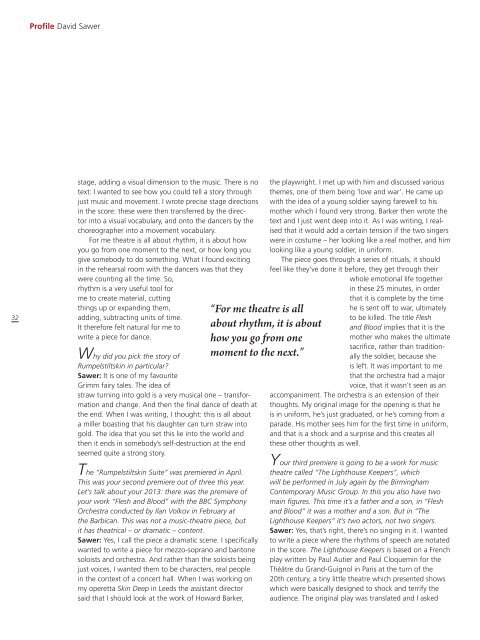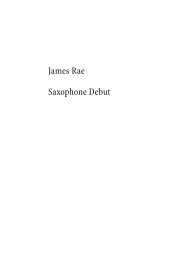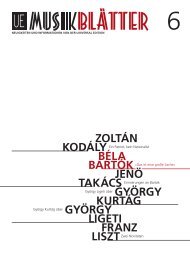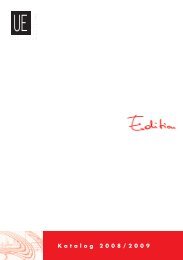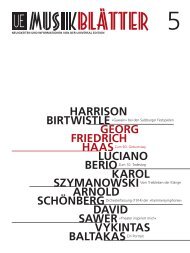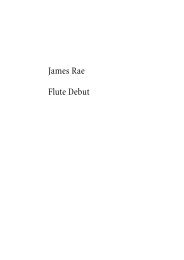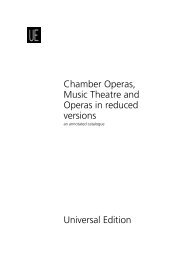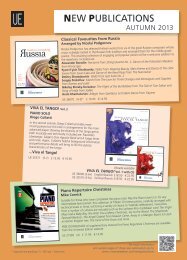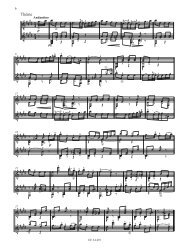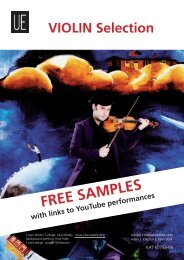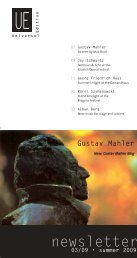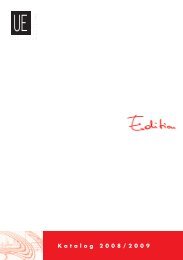Download a PDF file - Universal Edition
Download a PDF file - Universal Edition
Download a PDF file - Universal Edition
Create successful ePaper yourself
Turn your PDF publications into a flip-book with our unique Google optimized e-Paper software.
Pro<strong>file</strong> David Sawer<br />
32<br />
stage, adding a visual dimension to the music. There is no<br />
text: I wanted to see how you could tell a story through<br />
just music and movement. I wrote precise stage directions<br />
in the score: these were then transferred by the director<br />
into a visual vocabulary, and onto the dancers by the<br />
choreographer into a movement vocabulary.<br />
For me theatre is all about rhythm, it is about how<br />
you go from one moment to the next, or how long you<br />
give somebody to do something. What I found exciting<br />
in the rehearsal room with the dancers was that they<br />
were counting all the time. So,<br />
rhythm is a very useful tool for<br />
me to create material, cutting<br />
things up or expanding them,<br />
adding, subtracting units of time.<br />
It therefore felt natural for me to<br />
write a piece for dance.<br />
Why did you pick the story of<br />
Rumpelstiltskin in particular?<br />
Sawer: It is one of my favourite<br />
Grimm fairy tales. The idea of<br />
straw turning into gold is a very musical one – transformation<br />
and change. And then the final dance of death at<br />
the end. When I was writing, I thought: this is all about<br />
a miller boasting that his daughter can turn straw into<br />
gold. The idea that you set this lie into the world and<br />
then it ends in somebody’s self-destruction at the end<br />
seemed quite a strong story.<br />
The “Rumpelstiltskin Suite” was premiered in April.<br />
This was your second premiere out of three this year.<br />
Let’s talk about your 2013: there was the premiere of<br />
your work “Flesh and Blood” with the BBC Symphony<br />
Orchestra conducted by Ilan Volkov in February at<br />
the Barbican. This was not a music-theatre piece, but<br />
it has theatrical – or dramatic – content.<br />
Sawer: Yes, I call the piece a dramatic scene. I specifically<br />
wanted to write a piece for mezzo-soprano and baritone<br />
soloists and orchestra. And rather than the soloists being<br />
just voices, I wanted them to be characters, real people<br />
in the context of a concert hall. When I was working on<br />
my operetta Skin Deep in Leeds the assistant director<br />
said that I should look at the work of Howard Barker,<br />
“For me theatre is all<br />
about rhythm, it is about<br />
how you go from one<br />
moment to the next.”<br />
the playwright. I met up with him and discussed various<br />
themes, one of them being ‘love and war’. He came up<br />
with the idea of a young soldier saying farewell to his<br />
mother which I found very strong. Barker then wrote the<br />
text and I just went deep into it. As I was writing, I realised<br />
that it would add a certain tension if the two singers<br />
were in costume – her looking like a real mother, and him<br />
looking like a young soldier, in uniform.<br />
The piece goes through a series of rituals, it should<br />
feel like they’ve done it before, they get through their<br />
whole emotional life together<br />
in these 25 minutes, in order<br />
that it is complete by the time<br />
he is sent off to war, ultimately<br />
to be killed. The title Flesh<br />
and Blood implies that it is the<br />
mother who makes the ultimate<br />
sacrifice, rather than traditionally<br />
the soldier, because she<br />
is left. It was important to me<br />
that the orchestra had a major<br />
voice, that it wasn’t seen as an<br />
accompaniment. The orchestra is an extension of their<br />
thoughts. My original image for the opening is that he<br />
is in uniform, he’s just graduated, or he’s coming from a<br />
parade. His mother sees him for the first time in uniform,<br />
and that is a shock and a surprise and this creates all<br />
these other thoughts as well.<br />
Your third premiere is going to be a work for music<br />
theatre called “The Lighthouse Keepers”, which<br />
will be performed in July again by the Birmingham<br />
Contemporary Music Group. In this you also have two<br />
main figures. This time it’s a father and a son, in “Flesh<br />
and Blood” it was a mother and a son. But in “The<br />
Lighthouse Keepers” it’s two actors, not two singers.<br />
Sawer: Yes, that’s right, there’s no singing in it. I wanted<br />
to write a piece where the rhythms of speech are notated<br />
in the score. The Lighthouse Keepers is based on a French<br />
play written by Paul Autier and Paul Cloquemin for the<br />
Théâtre du Grand-Guignol in Paris at the turn of the<br />
20th century, a tiny little theatre which presented shows<br />
which were basically designed to shock and terrify the<br />
audience. The original play was translated and I asked


